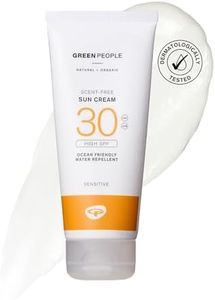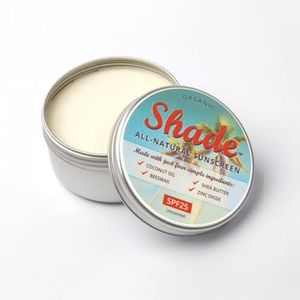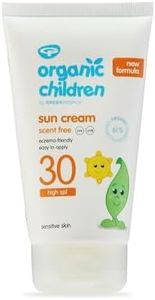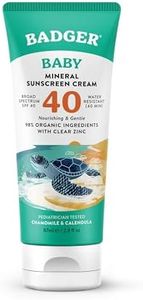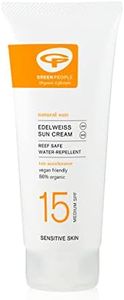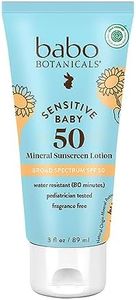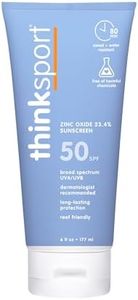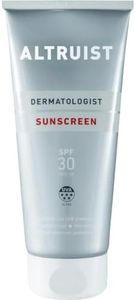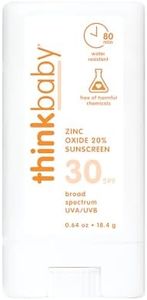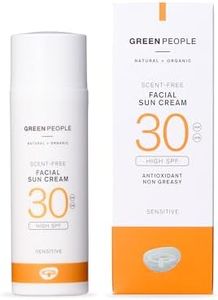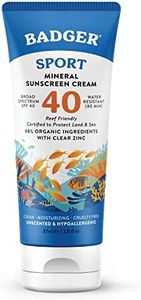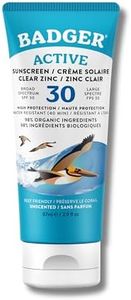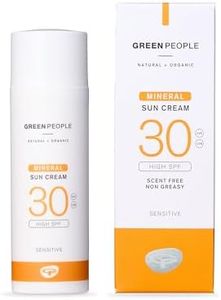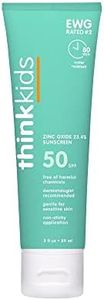We Use CookiesWe use cookies to enhance the security, performance,
functionality and for analytical and promotional activities. By continuing to browse this site you
are agreeing to our privacy policy
10 Best Non-Toxic Sunscreens
From leading brands and best sellers available on the web.Recommended lists
Buying Guide for the Best Non-Toxic Sunscreens
Choosing the right non-toxic sunscreen is essential for protecting your skin from harmful UV rays while avoiding potentially harmful chemicals. Non-toxic sunscreens are formulated with safer ingredients that are less likely to cause irritation or long-term health issues. When selecting a non-toxic sunscreen, it's important to consider several key specifications to ensure you get the best product for your needs. Here are the key specs to look out for and how to navigate them.Active IngredientsActive ingredients in sunscreens are the components that provide UV protection. In non-toxic sunscreens, look for mineral-based ingredients like zinc oxide and titanium dioxide. These ingredients sit on top of the skin and reflect UV rays, making them safer and less likely to cause irritation compared to chemical sunscreens. If you have sensitive skin or are concerned about chemical exposure, opt for sunscreens with these mineral-based active ingredients.
SPF RatingSPF stands for Sun Protection Factor, and it indicates how well the sunscreen can protect your skin from UVB rays, which cause sunburn. SPF ratings typically range from 15 to 50+. For everyday use, an SPF of 30 is usually sufficient, providing about 97% protection from UVB rays. If you plan to spend extended time outdoors, especially during peak sun hours, consider a higher SPF like 50 for added protection. Choose an SPF based on your sun exposure and skin sensitivity.
Broad Spectrum ProtectionBroad spectrum protection means the sunscreen protects against both UVA and UVB rays. UVA rays can prematurely age your skin, causing wrinkles and age spots, while UVB rays can burn your skin. Both types of rays can contribute to skin cancer. Ensure the sunscreen you choose is labeled as 'broad spectrum' to get comprehensive protection. This is crucial for overall skin health and effective sun protection.
Water ResistanceWater resistance indicates how well the sunscreen stays on your skin when you sweat or swim. Water-resistant sunscreens are labeled with the duration they remain effective, typically 40 or 80 minutes. If you plan to be active outdoors, swimming, or sweating, choose a water-resistant sunscreen to ensure continuous protection. Reapply as directed, especially after swimming or heavy sweating.
FormulationSunscreens come in various formulations, including lotions, creams, sprays, and sticks. Lotions and creams are great for full-body coverage and are often more moisturizing. Sprays are convenient for quick application and hard-to-reach areas, but ensure even coverage. Sticks are portable and easy to apply on the face and sensitive areas. Choose a formulation that fits your lifestyle and application preferences.
Skin Type CompatibilityDifferent sunscreens are formulated for different skin types, such as oily, dry, sensitive, or acne-prone skin. Non-toxic sunscreens often include natural ingredients that cater to specific skin needs. For example, if you have dry skin, look for sunscreens with hydrating ingredients like aloe vera or hyaluronic acid. If you have oily or acne-prone skin, choose a non-comedogenic formula that won't clog pores. Match the sunscreen to your skin type for the best results.
Additional IngredientsNon-toxic sunscreens may include additional beneficial ingredients like antioxidants, vitamins, and natural extracts. These can provide extra skin benefits, such as hydration, anti-aging, and soothing properties. Look for sunscreens with ingredients like vitamin E, green tea extract, or chamomile if you want added skincare benefits. Consider your skin concerns and choose a sunscreen with ingredients that address those needs.
